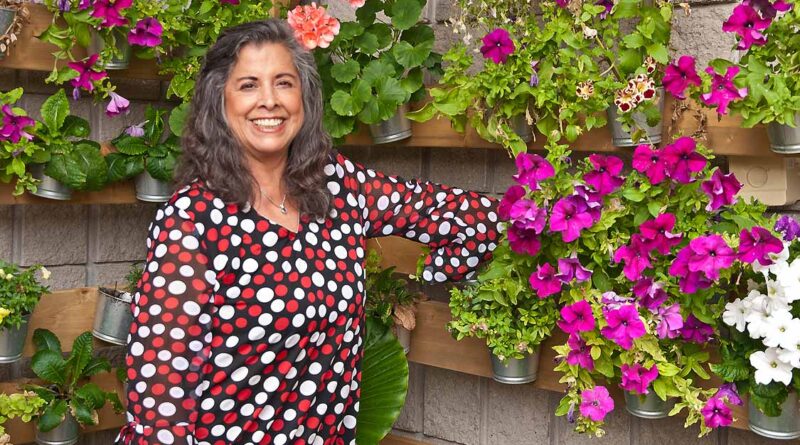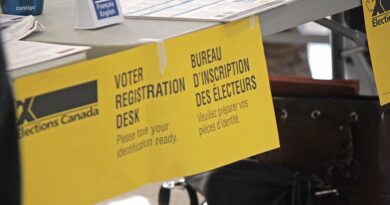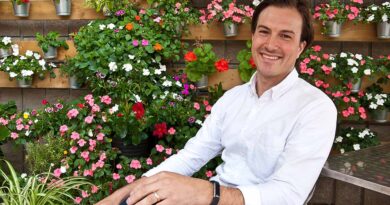Cynthia Wesley-Esquimaux: Connections
SUNonline/Orillia profiles candidates from each party in the forthcoming federal election.
By John Swartz
This is not Cynthia Wesley-Esquimaux’s first attempt to become Simcoe North’s MP. She tried to get the Liberal nomination in 2019 and lost to Gerry Marshall. This time around there wasn’t a nomination race; she was acclaimed the party’s candidate, which does not mean there weren’t others who may have contested the nomination. In this case the party chose her to be their candidate.
“I don’t know the machinations at the other levels, but I had run in the past election in 2019 for this nomination for this riding. I think they just said, we’re going to do a snap election and this person has already been vetted through, we know all about her, we have all the paper work and everything we need from her, so they just went ahead created the nomination,” Wesley-Esquimaux said.
“I’ve been involved with the liberal party all my life, since I was really young in Toronto. What I understood of the Liberal Party was in line with my own thinking. I’m kind of a humanist. I believe we have an obligation and a responsibility that really comes out of Indigenous roots, to be assertive and to protect the vulnerable. It isn’t for us about how much money we have, it’s about how much community we have, how much family we have, how much service we give. I have voted for the NDP in the past when I thought their message was coming through very much in line with mine as well, but I have never been an NDP person.”
Wesley-Esquimaux is a member of the Chippewas of Georgina Island, married, with twin daughters and two step- daughters. She has only lived in Orillia for three years, but she is no stranger to the area.
“If you want to talk about how long I’ve been associated with the territory, I would say millennia. My ancestors are from this territory. At one point in time it was one territory and now it is Christian Island, Rama and Georgina Island,” she said.
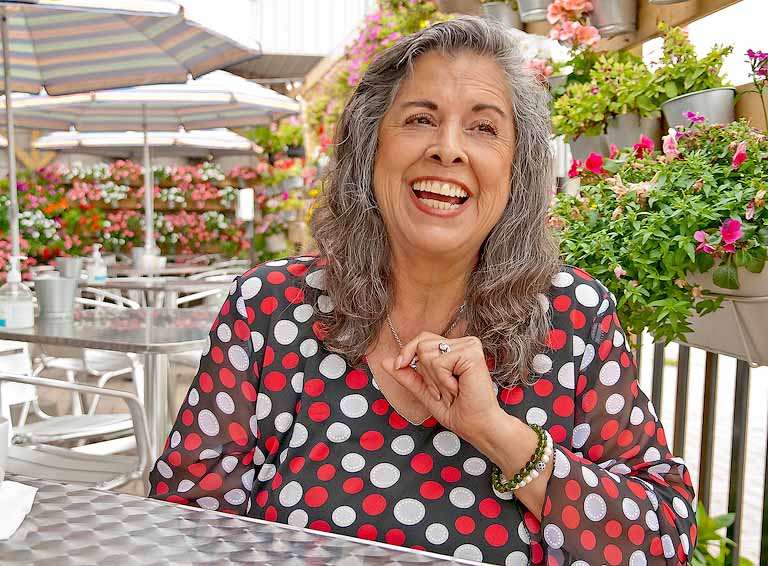
“I have lived on the shores of Lake Simcoe for well over 20 (years) and have been a part of the community in a variety of ways since I was young. A lot of my work goes back to when I was 16-years-old, I was raised in Toronto by two residential school survivors. It wasn’t a pleasant beginning, but it was something to work with. I went to work in insurance for about 4 years and I moved to California for 5 years. There is where I became politicized because I had opportunity to hang out with the Agua Caliente (Band of Cahuilla Indians) people who had tribal status cancelled and we had to go to D.C. (Washington) a lot and argue their case. So, I got a lot of exposure to what it looks like to lobby government and be in a position as indigenous people where you have to fight for your rights.”
She came to Orillia because of her appointment in 2016 as the first Indigenous Chair for Truth and Reconciliation at Lakehead University. Previously she was Vice Provost for Indigenous Initiatives at Lakehead and before that Chair for Indigenous Leadership at the Banff Centre for Arts and Creativity where she is still on the faculty.
“As the chair, my job is really to be the public face of Lakehead University for the president and I advise the president when she has questions about what is happening across the country,” she said.
Most of her career has been in academia, or working for organizations on Native issues.
“When I was still living in California I decided to go back to school because I had dropped out and I graduated from Palm Springs High and went to the College of the Desert (Palm Desert, California), which had an associate arts program. From there I came back to Toronto and went to U of T (Anthropology and Sociology). I got married and I had twins,” she said. Then came work, which oddly enough probably involved as much research and learning as going to school.
“I worked for all of these chiefs (with the United Anishinabek Nation). I worked for Rama, Christian Island, I worked for 9 chiefs at the time and actually was the vice-chief, so I was involved in politics again,” she said. “(It) was to develop self-governing systems, taking traditional forms of governance and giving them modern expression. So I have a lot of experience doing that kind of work. Running for parliament is kind of along in the same line, we’re actually looking at what is the community doing? What is the community looking for? How do we take what the community wants to see happen and move it into a higher form so that we can have a discussion whether it’s legislative or going to be something else.” Wesley-Esquimaux, comparing the work which depended on government support, to what she experienced with the California group.
“We had to lobby government here and I remember people saying, “We don’t really do that in Canada.” And I said we really should because it’s the MPs and the MPPs that are making decisions and passing legislation that’s’ ultimately going to affect us, so we should be talking to them about what we want as First Nations people,” Wesley-Esquimaux said. Twelve years later when that work came to an end she went back to school.
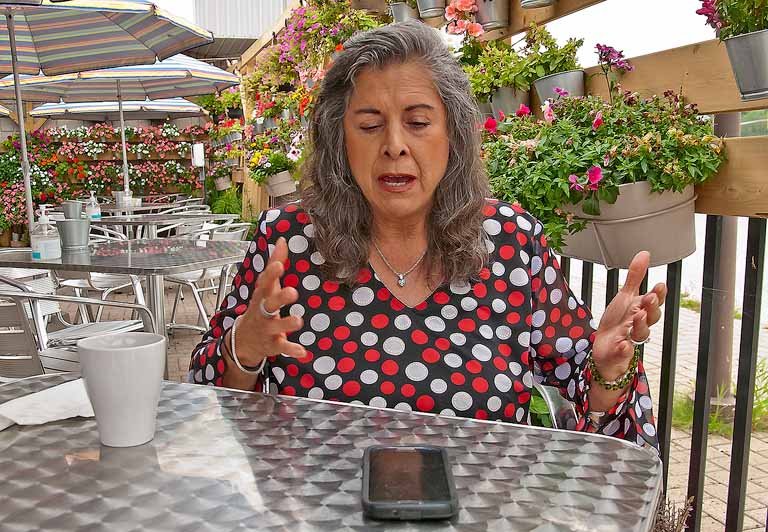
“Then I went back to graduate school and entered into the anthropology department at the University of Toronto, finished my master’s degree and went directly on into a PhD.” While in those programs she taught at the university, and Georgian College and Laurentian University.
“When I was in the north doing my doctoral work, because teachers kept leaving – they would stay for a couple weeks, a couple months and they would leave because of the isolation factor – I was also teaching kindergarten, Grades 2, 3… 7 and 8,” she said. All that happened after going back into school. The hard part was getting in, in the first place, which affected some of her work later in life, education reform.
“It wasn’t easy to get into school. We’re trying to get young people educated. It’s not necessarily an academic stream they need to be in to go into the trades, which is something we desperately need, but dropping out of school and getting back in it was very difficult to get into an academic program because they said – you don’t have the grades. I’ve argued for many students about getting into university because, just because they don’t have the grades when they were 17 or 18 doesn’t mean they are not going have the capacity as young adults to accomplish what they set out to do. We have to change the system to accommodate and I’ve argued people into school and they’ve graduated.”
If ever there was serendipity involved with choosing a thesis for a master’s degree or doctorate Wesley-Esquimaux had it because you are not going to believe what her papers were about.
“My master’s thesis was a study on the aftermath of the Bubonic Plague in Europe and the aftermath of epidemics on this continent. My doctorate was a look at the continuing of the unresolved trauma on Indigenous populations,” she said. The work she was doing with the United Anishinabek Nation directly influenced her doctoral work. She discovered that most people’s impression of rushing in with buckets of money for improvement programs, as governments tend to do, is putting the cart before the horse.
“My interest was, having been raised in a household with two survivors, seeing their behavior and being raised in the Native community in Toronto and watching their behavior; my question was – what the hell happened? Why are people behaving the way they are behaving? It was the addictions, the sexual violence, the domestic violence, unemployment, the anger, what was all that about? I really wanted to understand. Working in these communities for 12 years, I also observed a huge amount of dysfunction, a huge amount of hurt. People would say to me, “we’re really not ready to do governance until we resolve the fact we’ve got so much pain in our community. There’s a lot of hurt and we don’t understand it. So I moved from government systems to working on a personal development, personal responsibility stuff, and that’s what really lead me back to school.”
Truth and Reconciliation
While not a subject talked about with other candidates, Native affairs can’t be overlooked in Wesley-Esquimaux’s case because it has consumed much of her work-life. After the Truth and Reconciliation Commission was created, she became involved in 2014 as an honoured appointee, an Honourary Witness to the Truth and Reconciliation Commission of Canada, and at the same time she became Chair of the Governing Circle for the National Centre for Truth and Reconciliation at the University of Manitoba.
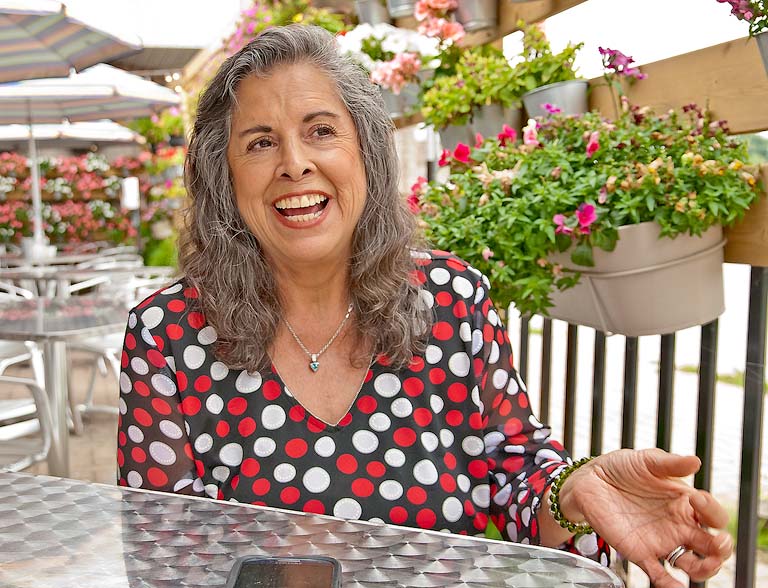
“There were a number of people like myself, well over 100, doing the work on the ground, working with people, not just Indigenous people, but all people, to bring them together to create peaceful relations, that have been appointed as witnesses and also they are charged for the rest of their life. The task is to speak up in instances of where there’s stereotyping or micro/macro aggression, racism and to say, “That’s not appropriate,”” she said. It was like serving on a council, or board of advisors.
“We just met recently. It’s kind of like a concerned citizen club,” Wesley-Esquimaux said. It’s not a stretch to imagine she has her fingerprints on some of the 94 Calls to Action.
“My fingerprints are probably on a lot of different elements because I have been actively engaged in child welfare and I believe very strongly there needs to be some federal legislation put in place that shifts the relationship that we have with the provinces who are now responsible for child welfare,” she said.
“The federal government doesn’t do child welfare. They provide the resources to the provinces and the provinces allocate those resources accordingly and I think that relationship needs to be adjusted because right now many of the provinces feel like the standards are the standards and the standards apply to everybody, but the realities are, and I’ve been way up in Labrador and I’ve been in Old Crow, Yukon, it’s not the same there. So you try to apply standards that are workable in Orillia to some place in northern Labrador, it doesn’t work. So there needs to be some adjustment there.” Wesley-Esquimaux also had input on environment and education aspects of the commission’s work.
People wonder, especially in light of recent events, what has happened with the 94 Calls to Action. Was that just another white paper to store on a shelf?
“People look at, for instance, Minister (Carolyn) Bennett’s work (Minister of Crown-Indigenous Relations and Northern Affairs) and say, “They haven’t done anything for the 94 Calls to Action, and they haven’t done anything for the water and all this,” but I know because we’ve had conversations about it. Something like 87% of those Calls to Action hare being worked on. Some of them have been completed and a number of them are in process,” Wesley-Esquimaux said. “There may be many tables across the entire region, including our region, that are developing or working on issues that need to be resolved, but they don’t get into the public domain until they are complete because they are not news until they are actually finished,”
Decision Making
One of the things each candidate is asked is how do you arrive at decisions? This is an important question because it’s clear some politicians don’t consult, or consult with the wrong people or vested interests, often ignoring good evidence and research. It seemed proper to put this question in terms of Native traditional decision making, i.e. going around the table and allowing each person to speak their mind before arriving at a consensual decision, is that how Wesley-Esquimaux thinks decision making should be?
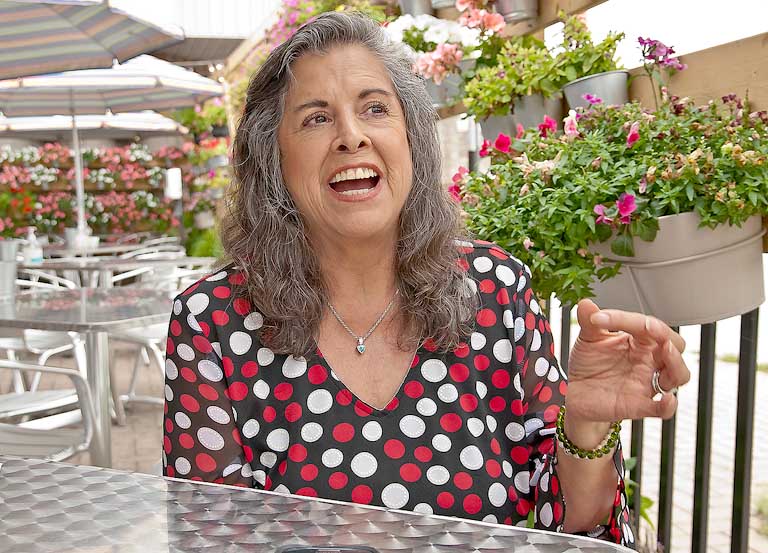
“Yes,” she said. “ One thing that I do and have done consistently for decades is work from the ground up in so many ways and listening very carefully to what people are saying, what people feel is important that needs to get done and then working through the process all the way up,”
“If you are the people and you don’t speak to your council, your council still has to make decisions and you just crossed yourself out; If the council doesn’t talk to the chief about what the council has heard from the community, it crosses them out and the chief still has to make decisions; it goes to the regional level and if the chief doesn’t talk to the regional chief, they are cancelled out and the regional chief is still going to have to make decisions; and the National chief is going to have to make decisions if the regional chiefs don’t speak to him or her, and that comes back to bite you in the butt if you don’t get engaged in the conversation. So I believe very strongly that people on the ground have absolutely every right and expectation they will be involved in the conversation that’s going to dramatically and directly affect their lives.”
Policing
Again, this is a provincial issue in terms of regulation and some funding, but the federal government does have control over the RCMP and has a granting function playing a role. They also have the ability to amend the criminal code. How does Wesley-Esquimaux see an effect of federal leadership many believe the government can have on issues of police conduct of late.
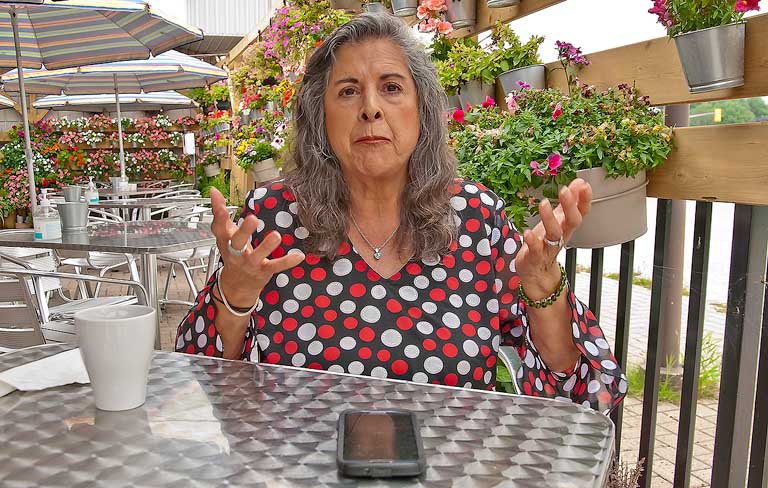
“I’ve had a lot of occasions to listen to people who had direct interaction with policing that wasn’t very pleasant; they were talking about missing daughters and children and mothers. Each time we travelled we had RCMP in the room because of the minister (Jody Wilson-Raybould, justice minister and attorney general and chair of the working group of ministers on the review of laws and policies related to Indigenous Peoples) and I had opportunity to speak to them and it ranged quite dramatically from a lot of anger their colleagues would do anything like had happened, to the other side where they absolutely said there’s no possible way that a police officer would talk like that or do anything like that. I know use of force is an issue,” Wesley-Esquimaux said.
“It’s a culture you know, wherever they are. It’s like anything. You have a corporation, there’s a community and there is a culture. People come into that place and they work in that culture while they are there and they leave and enter into another culture altogether. That’s the way it actually is. I’ve been in situations with policing in urban centers where this division is really good. I think, “Wow, you guys are really thorough, you are kind to the kids,” and then go to another division and it’s almost certain there’s a division between them and the kids in the community, its rougher and it stays that way generation to generation.”
“The RCMP has been held more accountable in the remote communities where you mostly find them. We have had big struggles with our communities. The RCMP are the people that actually also went and picked up people when it came to residential schools. There’s a very big divide between, and certainly in B.C. the whole question of sexual violence as well. I think the federal government can do something there, but when it comes to a riding like this it’s really the people themselves that have the voice – what is it you want from the police officers in your riding? I don’t think they care so much about the police officers that are happening in B.C., but they really want to know how do we get accountability from our own officers here?”
Continuing, she draws in other concerns which effect policing, public apathy (until of late), costs of change and education.
“This is the biggest issue I see as well. If you are not close to the ground and you are not listening to what people actually are interested in and actually pursuing, because the reality is most people in a city like this are more concerned about what’s happening around households and what’s happening around neighbourhoods and they want to have the peace and quiet, go to work, raise their children, be able to have a living wage so they can actually feel comfortable. In a country like this they should have that, but we have this massive landmass called Canada and we have a very small population; we’re trying to protect this massive landmass and keep everybody happy with a very small population who doesn’t want to pay more taxes because taxes take money out of their pockets, but the realities are it (taxes) puts things in place,” Wesley-Esquimaux said.
“I know that’s a hard argument and I’m not suggesting I’m going to carry the standard of the need to pay more taxes, that’s not what I’m saying. If we take a holistic view of everything we have and who we are as a country, we understand we need more bodies. We’re an aging population. We’re coming into this kind of tsunami of retirees. We have less young people that are qualified to take on this information technology and to step into the positions that are going to run it. It doesn’t mean they don’t know how to use a computer, they do. But, do they actually do research, are they innovating products? What are they doing? We need to utilize resources more effectively, as opposed to asking for more resources without any kind of a justification.”
Change Within
If elected, Wesley-Esquimaux will have some ability to nudge the Liberal Party toward becoming better. All candidates are being asked what they would change about their party – or do more of.
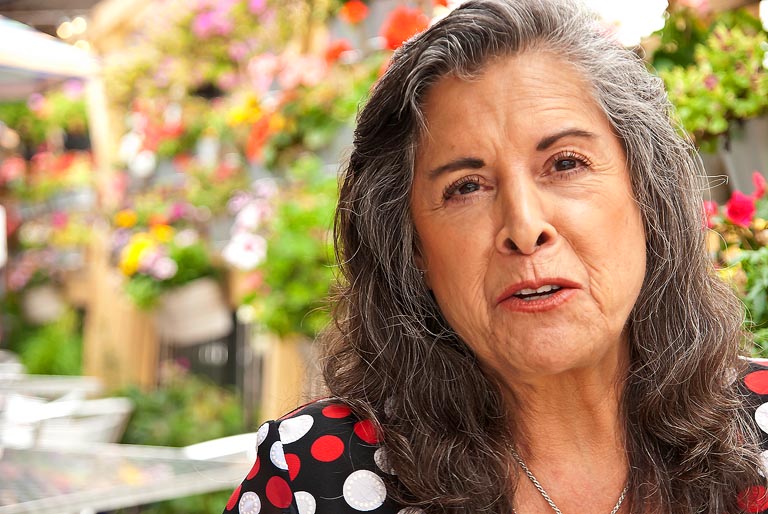
“I think they need to do more of what I am bringing to the table, for sure, which is to resolve some of these intractable issues around Indigenous population of Canada so the Indigenous population can become a part of society in a way it’s always wanted to and needs to,” she said. Part of her point is what benefits Natives, benefits all of us. She then focused on what all parties seem to do – target the middle class for policy and votes, which if anyone has been paying attention, the middle class isn’t what it used to be, in size or economic power.
“I think the only thing I have disagreed with to any extent is the question of the middle class because I have never been a part of the middle class, maybe I am now; my work has always been with the more vulnerable, whether it’s been children, or people in poverty, First Nations communities, that kind of thing, and I always feel when you’re gearing your policies and your approach to the middle class, you’re leaving out a significant part of the population of the country.”
“We have a pretty significant population that is hand to mouth. They’re not in a place where they have access to education, that whole Universal Basic Income piece. When I was in Thunder Bay, that was one of the cities that was an exploratory place, and it had a tremendous effect. We had women starting school; there was a gal bought a car so she could now get to a job, it changed everything for some people, and a soon as Ford got in he cancelled it immediately. I think he really hurt a lot of people. I saw that as just being mean.”
The Future of Work / Universal Basic Income
Both these topics are dependent on each other and Wesley-Esquimaux provided the segue to address what happens in the next 5, 10 or 20 years as automation threatens to put thousands, if not millions out of work.
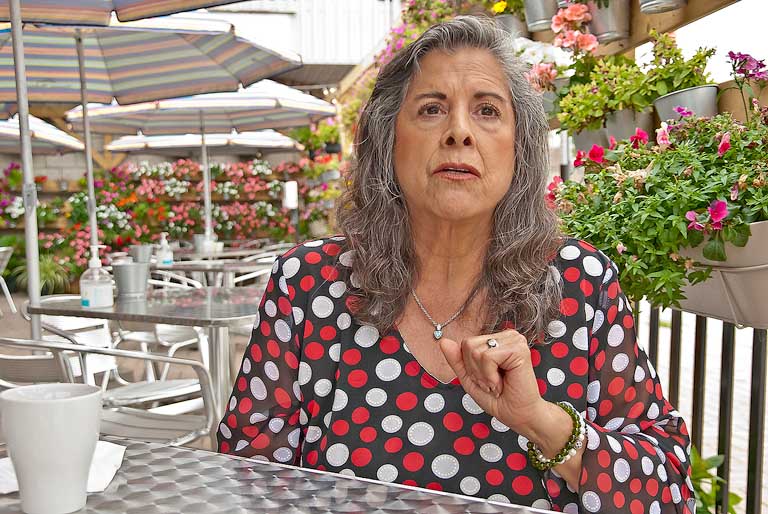
“We’ve been seeing that for a while. They said, “don’t bother learning how to drive a truck because it’s not going to be a job that’s handed to a person. That’s not the only one; we’ve seen a lot of jobs disappear,” said Wesley-Esquimaux.
Many candidates for elected office answer this question with a notion there will always be some kind of work for people to go to, without recognizing the typical stop-gap jobs, like bagging burgers at McDonald’s are also being automated out of existence.
“And they’ve been automating for at least 5 to 10 years,” Wesley-Esquimaux said. “I’m very aware of what you are talking about. I’m one of those people that probably failed science in high school, but absolutely loves it and reads about it all the time. I’ve read about the trucks and I’ve said don’t bother learning that, it’s not going to be there for you. We have to undo the tightly narrated definitions of education and change them completely to accommodate where we are going. We are now in a place where we are experiencing, and I notice the Conservative Party has not been very on to it, but we are in a climate crisis. You just have to look around you at what’s happening. I’ve had elders in my community –“oh, it’s just a cycle, it’s normal and it’s all going to go back to being the way it was.” I don’t think so. Not this time. We’re going to have more people coming into the country because of environmental refugees. It’s already happening.”
“What we really need to be doing with our young people. We need to take it outside; we need to get people excited about working in different kinds of environments. It’s not going to be about McDonalds, those are not the kinds of jobs. Coming back to the basic income piece, the pandemic has shown us it’s possible, its expensive and now we can’t people sometimes to go back to work, especially the low income ones.”
What also is not understood about UBI – beside how it is proposed to work – are the various ideas of how to afford it; number one being taxing the machines replacing people.
“Raising money is an interesting thing. The Harper government knocked one cent off the HST and it cost billions of dollars in the end. Putting one cent back on, are people really going to miss that? I don’t know. If it comes down to how do we actually fund people’s lives and give them an ability to earn a decent wage, have a place to live, raise their children without having them starve to death. We have to start thinking differently,” she said.
“It takes innovation and imagination. How are we going to get people to think that way? That’s one of the issues around government and one of the reasons why we can’t keep doing the same thing we’ve done because that’s insanity. We have to start talking about other approaches and we have to start arguing at those tables about what we can do differently so people have an opportunity in the future.”
Saving Ourselves From Ourselves
SUNonline/Orillia has pitched two ideas to each candidate. One is to create a ministry of preparedness, interested in being ready for anything across several other ministries. The other is to be a standard bearer for a National effort, similar to the World War 2 effort to convert industry to war production in order to catch up with things like climate change, looming unemployment on a massive scale, healthcare costs going to the moon and etc. Wesley-Esquimaux believes we are already taking dips in the shallow end of the pool on such a grand scheme by bringing up the concerted effort to battle forest fires in Western Canada.
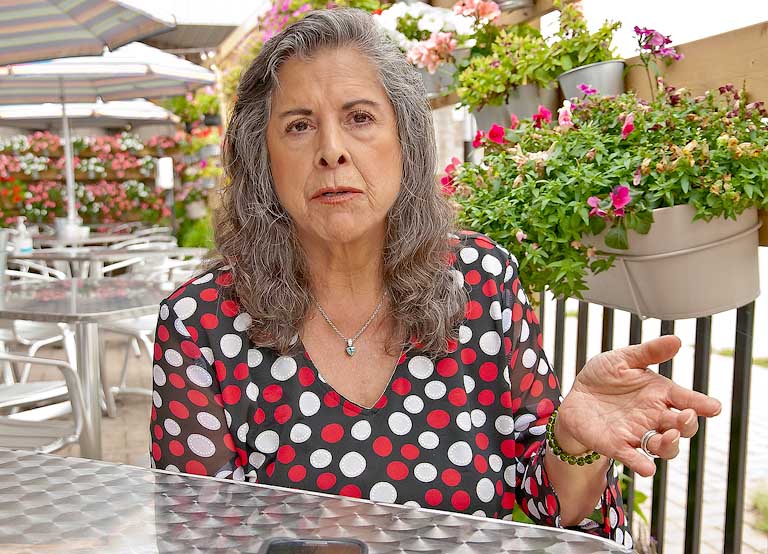
“It’s already happening with the fires and the floods and the drought. Ontario has been quite protected this particular season because we’ve had a lot of rain, so we’ve almost becoming the bread basket for everybody else because we’ve been able to grow things where a lot of people out west have not. So we’ve already in crisis mode. We’ve allowed people to become too complacent. Look what happened with the pandemic. At least in the education sector we had to pivot immediately to accommodate what our students and our education system did, and we did. People just flipped immediately online and we got all our classes up. Lakehead was able to get that done in weeks. We’d already started to do online; the foundations were kind of in place. Nobody was prepared for a pandemic, which they should have been. Even Barack Obama said let’s get ready for this because it’s coming; medical professionals said the same. I worked with the Banff Centre in Alberta and they lost 75% of their employees in a couple months. Banff, the city, almost shut down because it’s a tourist destination, but they had to pivot. The interesting thing was we had a lot of people come up to the Banff Centre, once we put it online we had access to a lot more people that had no capacity to travel or leave kids or families behind that actually started attending sessions. So it is possible to do what we need to do,” she said.
“In those days everybody had to collect metals and materials to create the stuff that was necessary for the war and we rallied behind it because it was about everybody. So how do you create a situation, with people here driving back and forth, B.C. is burning to the ground, they don’t really have – and we have TV, we have internet, we have access to that information, but somehow it’s not getting through.”
“It is a redirection, a reallocation of resources. I never forget we live in this massive country with a very small population. We need to allow more immigration. I don’t want to brain-drain other countries. That’s not the goal. We need to allow people that want to come here to come here. People pay taxes, people get work. If you are going to do massive training, it’s going to cost something. It’s going to mean taking people out of work and putting them in training,”
We weren’t ready for the pandemic, despite warnings. We aren’t ready for climate change, an aging population straining healthcare and pension sustainability either. Wesley-Esquimaux thinks that’s part of the human condition and needs to be addressed.
“That’s the way people are. If it’s going to cost them something they’re not interested until they are in the position, until they actually need it,” she said.
“We’ve been able to rally people here around Reconciliation. We have a fairly significant crowd of people from the Orillia riding that are participating with Gwen Boniface in a conversation on a regular basis because they are interested in something. What we have here is a frog in the water situation. With war, that’s what happens. Somebody drops a bomb all of a sudden people say that could have been us so we better get together and do something about it. They’re not necessarily seeing the connection between what’s happening in B.C., what’s happening in Alberta, what’s happening in Manitoba with what’s happening here. I agree, it’s important because people need to be able to talk about it. I talk about it all the time, that’s what I do,”
“We have become a society in so many ways that has forgotten about that responsibility. I talk to so many old people when I’m travelling around. Their work ethic, their contributions to society, their engagement with the world around them is very different from their grandchildren and they don’t understand – why does my grandson not care about anything other than what he’s watching on his little computer? Why do they not come out and get engaged in these conversations? We have become a society that has become dangerously complacent. Barack Obama – we’re not in America, but he started a ministry of sorts that was about preparedness and as soon as Trump came in he cancelled it all and sent everybody home. If you can’t preserve and protect something like that, it’s not going to be very helpful, is it? If the Liberal Party puts in a preparedness ministry, and we’ve got a lot of really talented, bright, young people in our country, and we pull them into this conversation and we give them the responsibility of laying out a plan for the future, we’re going to be fighting with the Conservatives and we’re going to be fighting with people who say it’s too costly and I don’t want to pay more taxes and I don’t want to have anybody telling me what to do. We’ve got people right now who don’t want to take the vaccine.”
“We privatized long-term care in this province and they weren’t ready. We got PSW’s that were actually employed in multiple centers as opposed to working in one, and they are carrying the COVID along with them whenever they are moving. People died. People abandoned some of these people and just left their jobs and a few (other) PSWs had to stay and try to maintain the food and the toiletry and everything for all these poor and very vulnerable, and people that cannot protect themselves,” she said, inferring a close look could have revealed the problem, but no one looked.
COVID
How does Wesley-Esquimaux regard the government’s response to the pandemic?
“I think the government made the kinds of steps that it felt were appropriate in the moment. I don’t think anybody anticipated this was going to be what it became. That is was going to kill people.” She said. The obvious issue was Canada did not have enough masks, gloves and ventilators on hand to cope.
“I know the Conservative government had shut down a lot of the manufacturing pieces on that. They said it wasn’t essential; we didn’t need to have that here. We shouldn’t have that happen here. We need more industry in this country. We’re having these conversations about other places where we have to go to get the goods we need when we have the capacity right here to create those goods ourselves. It’s going to take some resources to do that. It takes money to make money. I think any government that had been in office at the time would have been faced with the same kinds of barriers and the same kinds of confusion about what to do. There wasn’t enough PPE in hospitals where it should have been because again, it’s storage. Do we store stuff we use every day, or do we store stuff that we might, maybe have to use someday? I think that’s true of anything we do anywhere. We make decisions based on the reality in the moment. Do we need to have this now? Should we save this for the future?”
Corporate Hegemony
We have reached the stage where what is good for General Motors is no longer good for the country. Everything from the highest prices for cell phone service in the world, to saving the oil patch at all costs, obscene profits by large corporations at the expense of working wages and job security, and a few corporations controlling media and the internet have Canadians feeling powerless against the boardrooms of the country. Most people on the street know things need course correction, but there doesn’t seem to be the will in government to make change.
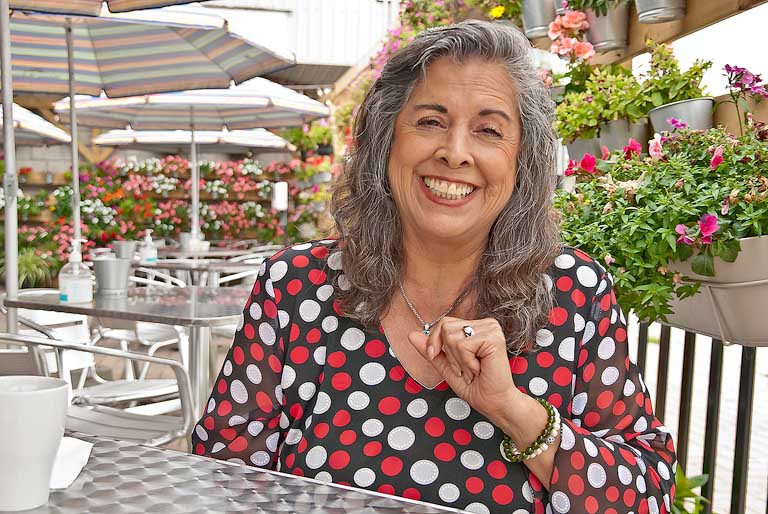
“It is a lot about greed. That’s one of the things about the differences in the parties. One is very focused on the economy, and money, and building corporations, and making sure there’s a lot of resources happening. I think it’s a bit of a fallacy that if we give corporations a tax break they’ll hire more people and more money will enter the economy and people will buy more things and all that stuff. Yet we have an economy that’s a little bit like a freight train out of control. It just keeps going despite the fact the tracks are all gone. We need to refocus ourselves back on people themselves and what they need to have – and all the small businesses that went under, that was tragic. They were harmed by everything and the rich got richer,” she said.
“I’ve been saying for a long time, “How many billions dollars do you need before you can sleep at night? We have mixed up priorities I think.”
Part of the problem is lying, on social media and in mainstream media. Law and regulation which once ensured at least mainstream media presented balanced, meaningful reportage was jettisoned, and the internet has been regulation free since inception. Yet, discourse in both is tearing the fabric of Canadian society and fostering the rise of extremist political groups. Controversy attracts eyeballs, which drives advertising sales, which drives higher dividends and if the latter is up, what’s the problem? We don’t have the rules and the ambition to stand up to what is wrong anymore. Corporations got away with putting a toe over the line and nobody said boo.
“It already happened and the watchers weren’t watching and it changed everything because once that toe was over the line and nobody tried to cut it off there was a flood and now we have governments that are afraid to say anything because they’ll get voted out. At the lower level, in small communities we have the same kind of situation. We have people who are afraid to challenge. People who really have a responsibility to do something proper and they are afraid to say anything because they’ll lose their vote. We have to get away from that piece.”
“This is the case again, of people not feeling their voices are heard, therefore giving up and saying to heck with it, I’ll just concentrate on being able to survive in my own little corner of the world. Now we’ve got people who are acting very much like Americans when it comes to COVID, when it comes to corporations, when it comes to making money, there’s a meanness that has permeated our society that I think is really important and we address. Canada has a reputation of being somewhat peaceful and polite, but we’re getting meaner, I think by the day, because we don’t have the capacity anymore to listen to the common man and woman and what they would like to see happen. They’ve given up.”
“We’ve moved away from people matter to money matters. It becomes meaner when you start to individualize to that extent, when you are more important than the rest of us. It maybe not so easy anymore because we have a lot of polarization,” Wesley-Esquimaux said.
China
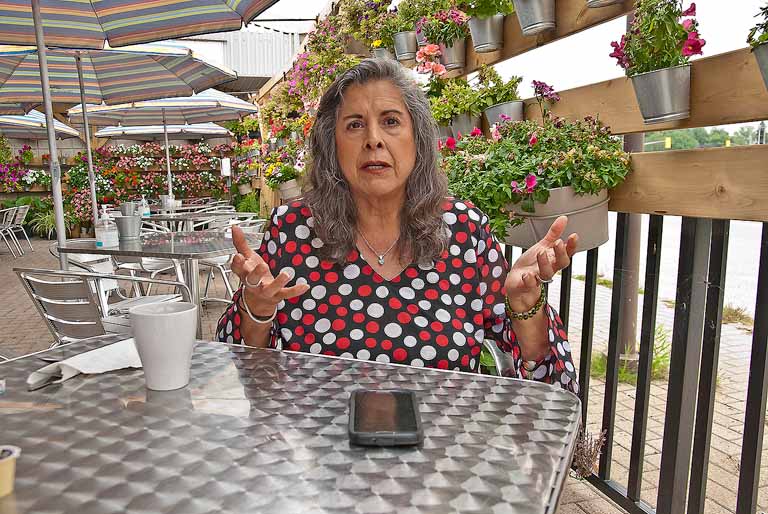
It becomes more apparent each day a decade’s long plan to destabilize Canadian society, from the economy to industry and governance is bearing fruit for the Chinese government. How do we stop and turn around the reliance on Chinese goods and the damage done to society?
“We have made some serious errors in judgment over the course of time with China because we have allowed, they bought up corporations and they bought up some of the oil patch and they send in their workers. Canada has been a very open and accommodating nation over the course of time, but that has allowed things to get in that aren’t so pleasant. It’s not something I work on. I certainly follow it. If they are shipping their own workers over here to do the work and then shipping them home that’s taking money out of the country and not accommodating our need to hire our own people. I don’t know what everybody’s so afraid of. It’s almost like people are afraid, I’m not going to get liked, and it’s somehow going to affect the ability to get voted back into office,” Wesley-Esquimaux said.
“China has a long history of human rights abuses. China is not the only country that has a history of human rights abuses. If you’ve ever been to the Museum of Human Rights in Winnipeg that has a lot of the atrocities human beings commit against each other. You will see it is far too easy for humanity to lose sight of itself and do some very atrocious things to each other, just by virtue of somebody being different. We have not removed stereotypes and racism from our society at all. It is still very much a part of who we are as people.”
“It’s not my area of expertise by any stretch of the imagination. I think maybe we need to take a harder line on a lot of things and that’s one thing that’s massive. We’ve been buying Made in China stuff since I was a small child and that has evolved over the course of time to where it is today. Were we prepared to be able to recognize the water is getting hotter? We have ministers who supposedly that is their job, they focused on that very specific area and their responsibility is to ensure there were protective mechanisms put in place. It’s not something that I would probably be working on, but I believe we have to be thoughtful about this entire country and how we manage it into the future,”
Healthcare
Alberta has jumped the shark on privatization of healthcare. Ontario is testing the waters. And still, dental, eye and hearing care, and prescription drugs are not part of the equation. As noted, costs are going up because of an aging population – not to mention the bill to be paid for the pandemic. The federal government’s only tool in this debate is grants to provinces. Should they be giving conditional grants, i.e. keep healthcare universal, include the other parts and take profit out of the equation?
“I know there isn’t any resource that’s been allocated toward that. I now there’s been a little bit of money pushed in that direction, but it’s not enough. As Canadians, again, that’s our responsibility to speak up to that, we could just let it happen. I remember Indigenous people had healthcare that covered eye and teeth and ears and everything else and it slowly became eroded,” she said.
“The National Chief at the time came to my community and said to the women in my community – we have an issue with healthcare they are eroding it, so you all have to stop taking your kids to the doctor in protest. And I said, “You can go to hell because if you are actually expecting these women with small children to not get healthcare so you can make a point, you’re dead wrong. That’s why you’re there, to kick their asses, not these ladies. That’s why you’ve been put in the position as National Chief. In a sense we’re kind of in the same boat. We’ve got people in a small community like this, who I don’t think they want to see privatized healthcare because then they have to pay for it and they may not have the ability to do that, and we have health ministers provincially and federally who are supposed to have the responsibility to say, “no, you can’t do that. You have to stay within these parameters because healthcare has to be available to everyone, not just those that can to pay for it.””
“We have a country that has been set up as a federation. I’m arguing with those provinces at the same time because of child welfare. You say you’ve got standards, they need to be adjusted. Manitoba was getting $32 million a year for child welfare services, which they decided how it played out. I’m like, that’s not good enough. If you are going to give money from the federal treasury to child welfare you’re going to have to figure out a way to bypass that because they are not doing the job that’s necessary, or you’re going to have to put in some legislative pieces or something that says this is the parameter, this is what you are going to do. Somebody has to be in charge.”
Part of the issue is what Wesley-Esquimaux calls procurement; the government buying of goods and services – and as relates to ideas, not getting good advice as seen with the failed Bill C-10 and the died-on-the-order-paper Bill C-36. Wesley-Esquimaux has ideas which apply to healthcare, those other items and a range of government services.
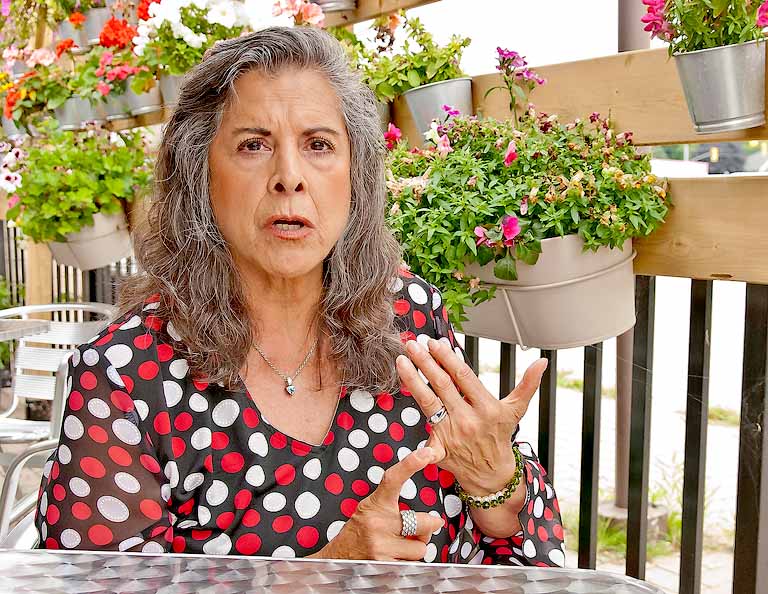
“That takes me to procurement too; this idea to actually work for government there is a procurement policy that you have to go through to be accepted to do the work. I know the government is a little bit behind when it comes to its technology. There is some issue around procurement and who gets to do the work. That’s where we are falling apart in many instances. It’s been a problem for me as an Indigenous person when I go into the north and we have doctors who shouldn’t really be doctoring, working in communities who are doing a very bad job. I’ve had personal experience with that. When my dentist in Barrie said – I tried to go into the north, my buddies and I had a couple weeks to go and do free dental work and we were told by the dentist who had already been procured, that’s their territory, stay out.”
“I said the same thing about housing. You’ve got people who are government sanctioned builders who are now putting shitty housing in the north because they can, because they are already under the umbrella. You’ve got to stop that. You need to let it be vetted like any other job that is happening anywhere else, whether it’s vaccines, or housing or medical, allow people the privilege of bidding for that and bring their skill sets into that.”
“Is it good? Those are issues, when you ask what I would change in the government – that is true of every government. I’m not saying it’s true of the Liberal Party, the Conservative Party. I’m just saying we really need to rethink what we are doing and how we’re getting things done across the country because it really creates a lot of barriers for some very good people,”
Abortion
SUNonline/Orillia didn’t anticipate this being an election issue, except that some MPs won’t let it go, and here were are, it is an issue, so the question to each candidate is, what is your position?
“I’m pro-choice, and I always have been. I believe women have the right to make that decision on their own behalf, but I also believe very strongly if we are going to have children born we have to be able to care for them,” said Wesley-Esquimaux.
“I’m sure there are people in the Liberal Party that are also against it to some degree. I guess because I’ve seen too much, I’ve seen too much harm. Young women who find themselves in situations, they have no resources, they have no place to go, they don’t have enough shelters for domestic violence, all of these things are in a circle. It’s not like this is a separate issue all by itself floating over here. Every single thing we’ve talked about is directly associated in some way to everything else,”
The Last Word
No interview captures all the points a subject believes are important, so each candidate gets the last word to bring their burning issue to light.
“There is a lot going on. I think the thing that is important is if I win this election what will be the first thing I will have to do. After listening to a pretty significant amount of people already in the riding, I know it’s going to be my responsibility and really speak up about what people in the riding have said. Yes I will be carrying the banner of reconciliation, I will be carrying it because it’s something I’ve carried for a very long time and something I feel very strongly about, but I will also be carrying the banner of this community and its needs; bring work back to this community, whether it’s through manufacturing or some other element, to broaden the scope of education so we get some of these kids who have dropped out back interested. I think I have to listen and I have to go and talk to the other ministers and talk about what are we going to do about water and I’m not talking about putting water back into First Nation communities and I understand that’s a need they are entitled to, but we’ve got a water war coming. We ought to be better prepared.”
(Photos by Swartz – SUNonline/Orillia) Main: Simcoe North Liberal candidate Cynthia Wesley-Esquimaux.
Support Independent Journalism
Previous Profiles:

